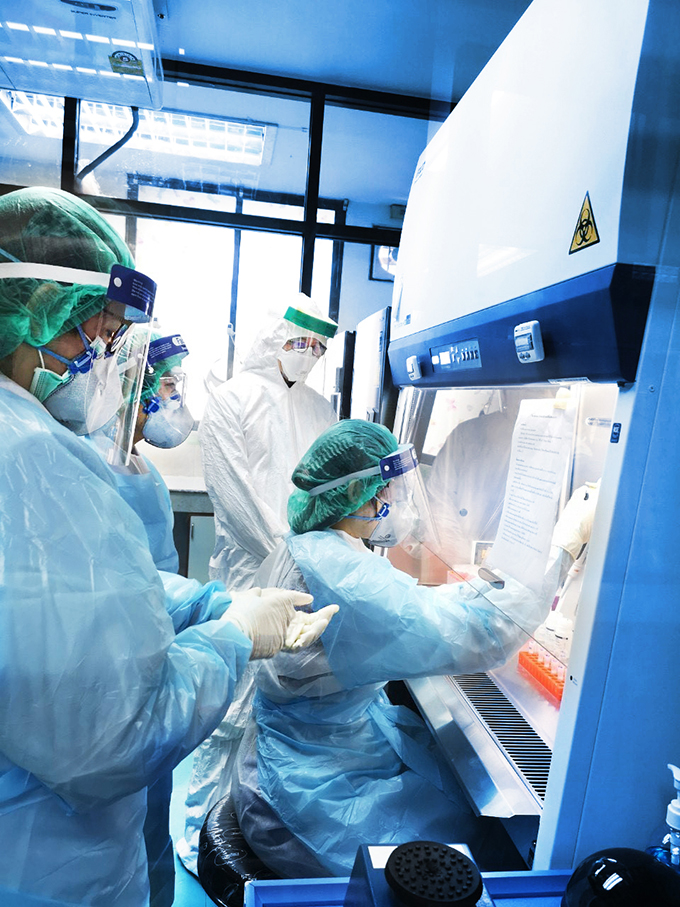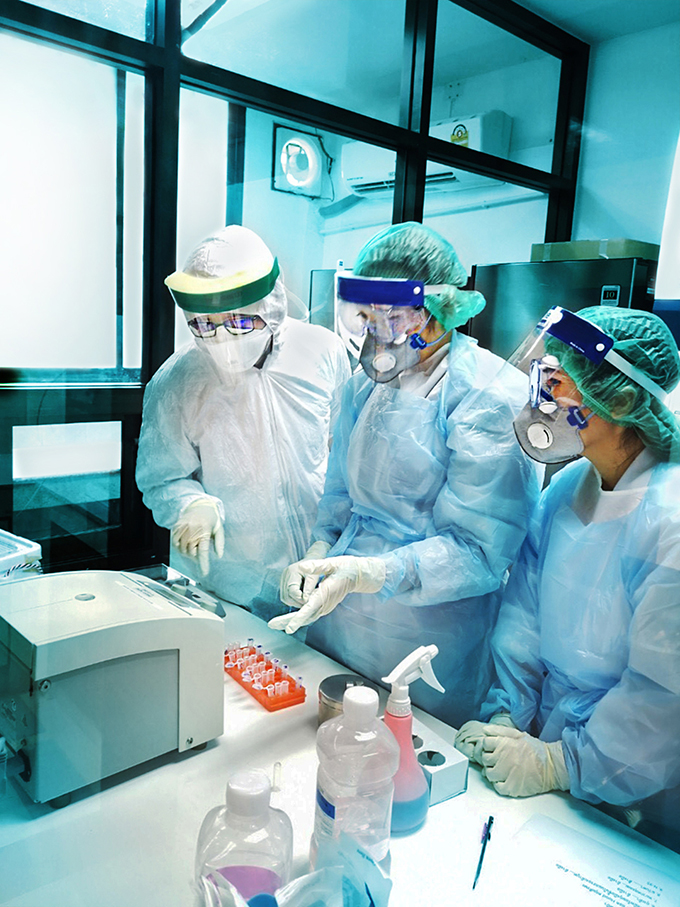CDC Response to COVID-19
About CDC


The COVID-19 pandemic is a unique threat to populations throughout the world. The U.S. government has taken unprecedented action to meet the challenges of this fast-moving public health crisis. CDC has an essential role in the response to the COVID-19 pandemic and remains steadfast in its mission to protect the safety, health, and security of America.
As the nation’s first line of defense against public health threats like COVID-19, we leverage the agency’s five core capabilities to move quickly and work 24/7 from laboratories to the front lines.
World-Class Data and Analytics
CDC is at the heart of a national effort to advance the data and data systems that can support the fight against COVID-19 and drive meaningful improvements in people’s health. Data modernization will improve data speed and flow, integration, analyses, visualizations, and interpretations to drive better public health decisions. Our cross-cutting strategy will move the vast public health system from tracking threats to anticipating them. CDC is helping build a digital public health superhighway to accelerate data-driven efforts, including the unprecedented volume of data driving the nation’s COVID-19 response. Our data modernization strategy will unlock the full potential of data for disease detection and health threat elimination. Following our strategy, CDC is improving data timeliness and quality, connecting data services and systems, working to reduce data collection and reporting burden on partners, and swiftly integrating emerging technologies and tools.

State-of-the-Art Laboratory Capacity
CDC is advancing science to stop the spread of COVID-19, building upon decades of experience and leadership in responding to infectious disease emergencies. Our science-centered, data-driven approach helps expand understanding of the virus and its transmission to reduce burden and impact to our nation.
CDC has developed multiple laboratory tests that help guide our nation’s response and protect public health. For example, a serologic test helps determine how much of the U.S. population has been infected with the virus that causes COVID-19. This test is designed and validated exclusively for broad-based surveillance and research to inform the response to COVID-19. Also, an Influenza SARS-CoV-2 (Flu SC2) Multiplex Assay is a real-time nucleic-acid-based test to detect COVID-19 and influenza A/B in the same test. It allows laboratories to process tests more quickly, conserve important testing materials, and simultaneously differentiate between viruses that cause similar respiratory infections. CDC supports state and local public health labs to increase testing ability and capacity so that states can continuously monitor and respond to their COVID-19 activity.
Elite Public Health Expertise
To accelerate the response to COVID-19, we continue to strengthen our response workforce and have thousands of personnel actively supporting the outbreak response. CDC’s world-class epidemiologists work tirelessly to understand the impact and natural history of the disease and virus. CDC is leveraging our scientific expertise to work with public health departments at all levels of government, clinical and healthcare organizations, technology companies, ministries of health, non-governmental organizations, and other organizations to help identify new cases quickly, break the chains of transmission, and prepare for vaccines and therapeutics when available.
Our website for COVID-19 information has received more than 2 billion visits. We continuously share the latest resources and information from our public health experts. CDC experts have developed thousands of documents providing guidance to government agencies, businesses, clinicians, schools, and the public. This lifesaving information recommends specific actions on infection control, hospital preparedness, personal protective equipment supply, clinical evaluation, case management, everyday preventive measures, worker safety, health promotion and risk communication, and much more. Communities, businesses, schools, healthcare workers, public health laboratories, and health departments across the country are using our resources to help propel the national response forward to reduce the spread of COVID-19.

Responding to Outbreaks at their Source
Public health is best done where people live, so CDC works with international and state, tribal, local, and territorial (STLT) partners in the field to provide resources, information, and scientific expertise to accelerate the response to COVID-19. Having a field presence enables CDC to share our knowledge with local response teams, empowering critical public health functions such as investigating outbreaks, contact tracing, screening for COVID-19 symptoms, conducting case interviews, and protecting borders and transportation networks.
CDC experts are in the field and ready to answer questions, address concerns, and provide strategies and tools to help international and STLT health departments conduct their COVID-19 response activities. To enhance and complement the efforts of STLT staff, we use a multi-pronged approach and innovative hiring mechanisms designed to address the surge staffing needs of health departments. CDC augments STLT efforts with multiple activities, including deploying CDC teams to address outbreaks in special settings, identifying and reducing heath inequities, and partnering with other federal agencies such as AmeriCorps to offer staffing options to states. Additionally, we work with health departments to support case investigations and contact tracing by deploying staff, training the contact tracing workforce, and providing guidance documents, training products, communication toolkits, and other resources.
Global Capacity and Domestic Preparedness
CDC works closely with domestic and international partners to increase preparedness and response capacity. CDC shares information on COVID-19 to answer crucial questions about the best ways to limit virus transmission and improve clinical outcomes. Domestically, CDC quickly awarded more than $12.3 billion directly to STLT partners to support response activities. These awards included support for collection of surveillance data reflecting the impact of the disease, laboratory equipment, reagents, and other specialized materials needed for processing and testing of COVID-19 samples, case investigation and contact tracing, including quarantine and housing needs for people who have been exosed to COVID-19, and infection control in healthcare facilities, including personal protective equipment purchases and fit testing. In addition, the Paycheck Protection Program and Health Care Enhancement Act provided $10.25 billion transferred from the Public Health and Social Services Emergency Fund (PHSSEF) that was awarded to health departments through the CDC Epidemiology and Laboratory Capacity program for testing and contact tracing. CDC is also working closely with STLT partners to plan for the equitable distribution and administration of COVID-19 vaccines.
A global response to COVID-19 will help curb human-to-human transmission, minimize the impact in vulnerable countries with limited preparedness capacity, and reduce specific threats that pose risks to Americans. Through these and additional efforts, we advance the Global Health Security Agenda to strengthen the world’s ability to prevent, detect, and respond to infectious disease threats.
Our activities enhance COVID-19 response capabilities within states, communities, and around the world to build longer-term, sustainable capacity for response to future disease threats. We leverage existing preparedness and capacity investments and redirect appropriate resources to ensure quick access to response funds. CDC teams have worked in the U.S. and around the world to increase capacity through training on infection prevention and control, adoption of systems for electronic data capture, and establishment of COVID-19 testing laboratories.
Since the beginning of the COVID-19 response, CDC has received $7.5 billion in supplemental funding through three congressional appropriations to support the agency’s response to COVID-19:
- $2.2 Billion – Coronavirus Preparedness and Response Supplemental Appropriations Act
- $4.3 Billion – Coronavirus Aid, Relief, and Economic Security (CARES) Act
- $1 Billion – Paycheck Protection Program and Health Care Enhancement Act
For information on CDC’s supplemental funding, visit https://www.cdc.gov/budget.
For more scientific information from the COVID-19 response, visit:
For more information on CDC’s response to COVID, visit: